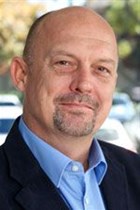Less green through more data protection?

With Green IT, a lot is being done to keep the ecological footprint of data centres as small as possible. Particularly economical and energy-efficient server and storage solutions are offered, which take a close look at heat generation and the associated air conditioning - even relocating entire data centres to climatically more suitable zones.
This is exceptionally good news for companies in South Africa who will need to adhere to the new Carbon Tax Bill coming into effect on 1 June 2019 where companies will be forced to try and lower their eco-footprint. However, with the growing threats from cyber criminals and higher data protection requirements due to the protection of informational self-determination, the efforts to ensure a "greener" IT can be thwarted.
Data protection is a must
But what exactly is the problem? The General Data Protection Regulation (GDPR) that has become compulsory in the European Union and the Protection of Personal Information (PoPI) Act that will soon come into play in South Africa, requires many measures to make IT more secure overall and regarding personal data. That is a challenge. This is because data must be available in encrypted form at all times.
Encryption in turn costs computing time. This can be done either by the processing systems or - better - by appropriate coprocessors. The additional computing power required for encryption not only requires more energy for the actual operation of the processes, but it also generates more waste heat. Therefore, data centre operators also must increase their energy consumption, which is necessary for air conditioning.
This effect is by no means limited to the European Union and South Africa. Other economic areas such as the United States, Japan and Israel - to name a few - have similar plans or implementations.
Rising energy demand
But the additional energy requirement for calculation and cooling is not everything. Data centre operators face other challenges in the storage environment. For a long time, some have depended on a storage environment that relies exclusively upon or to a large extent on SSD storage.
Although these storage media are faster than hard disk drives, they have a significant disadvantage. They require much more storage space to store encrypted content. SSDs work with an inherent encryption compression to be able to map as much data as possible to their storage.
Of course, this also serves to offer the customer a lower price per gigabyte. They encrypt the data with their own technology and use recurring patterns in the data, which can be combined - hence the space saving.
However, if this data is encrypted, as required by law, these patterns no longer occur. It becomes almost impossible to further compress encrypted content. The capacity of an SSD can thus actually be less than the official nominal capacity, since the "trick" of compression to specify higher storage space is now eliminated.
Therefore, much more SSDs must be used for encrypted data than for the same amount of information in unencrypted format. As a result, more SSD storage inevitably results in higher energy costs for its operation - and thus for cooling - than would be the case with HDDs.
Technology better used
What could a solution look like? The exclusive use of SSDs is therefore not an issue from an environmental point of view. Better is a hybrid model of Flash and hard disk drives that work under a common management, whilst Flash can perform caching using its advantage in speed. Personal data that is forced to be encrypted can thus be backed up to the hard disks - work data or applications on the SSDs.






























